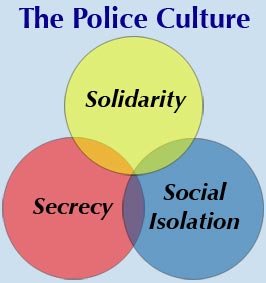Main Content
Lesson 2: TIntrodcution to Police Organization
The Police Culture
Culture, existing in most levels of society, may be defined as "the set of shared attitudes, values, goals, and practices that characterizes an institution or organization." This would seem to speak to the characteristics of a society in general. However, police have often been said to be a subculture—a part of but separate from the whole. Subculture has been defined as "an ethnic, regional, economic, or social group exhibiting characteristic patterns of behavior sufficient to distinguish it from others within an embracing culture or society." This definition seems appropriate when attempting to characterize a police organization. The police subculture has been characterized by three major norms: secrecy, solidarity, and social isolation.
Secrecy – Police officers involved in many sensitive operations and investigations often require secrecy. However, the issue of secrecy in policing far exceeds that which is necessary for normal operations. Secrecy in policing often extends to keeping silent about police deviant and even criminal behavior. Clearly, in society an informer or a rat is looked down upon. In policing, it is taken much more seriously. For example, if a police officer were to inform on another officer involved in criminal behavior, the informing officer would be viewed as a stool pigeon even though she or he did what his or her oath of office required.
Another crucial element in secrecy involves the invaluable reputation of an officer who may have allegations of misconduct lodged against him/her. Police departments are often criticized for refusing to reveal the names of addresses of officers accused of department or criminal violations. Because this practice has become so common placed in news reporting, little care is given to the impact this can have on the family and friends of the officer or the officer's future prospects of career advancement. This writer experienced such an incident in the beginning of his career, but was cleared of any wrongdoing. However, that incident haunted his career and was mentioned on the night of his retirement.
Solidarity – Most police officers believe that the only person to come to his or her aid will be another police officer. Each officer is acutely aware of his or her human side and the potential for complaints from the public or some violation of departmental rules and regulations. Under such circumstances, fellow officers are expected to come to the aid of the officer(s) in trouble. The "us v. them" mentality not only refers to the adversarial perception of police v. public, in which most police sincerely believe, but also extends to within the police organization itself—in that line officers do not trust police administrators. This distrust was the driving force for the modern era of police unionization, which began in 1969 with the Patrolman’s Association of New Orleans (PANO).
Social Isolation – Because of the nature of their work, police officers feel isolated from the public, an isolation partly self-imposed. Many police officers see what they do as "asshole control," with a perception that they are pitted against the public in a "them vs. us" contest. They also believe that the general public dislikes them, though research indicates that the public overwhelmingly feels positively toward the police. This tends to drive them into a more closely knit group. This cohesion is magnified by the requirements of the job which include, but are not limited to shift work, lack of holiday time with the family, and answering the call to duty during times of emergency with most other workers are with and caring for their families.

Reference
- http://www.merriam-webster.com/dictionary/culture
- http://www.merriam-webster.com/dictionary/subculture
- Van Mannen, J. (1978). The asshole. Policing: A view from the street. Peter Manning and John Van Mannen (Eds). Santa Monica, CA: Goodyear 221-238
